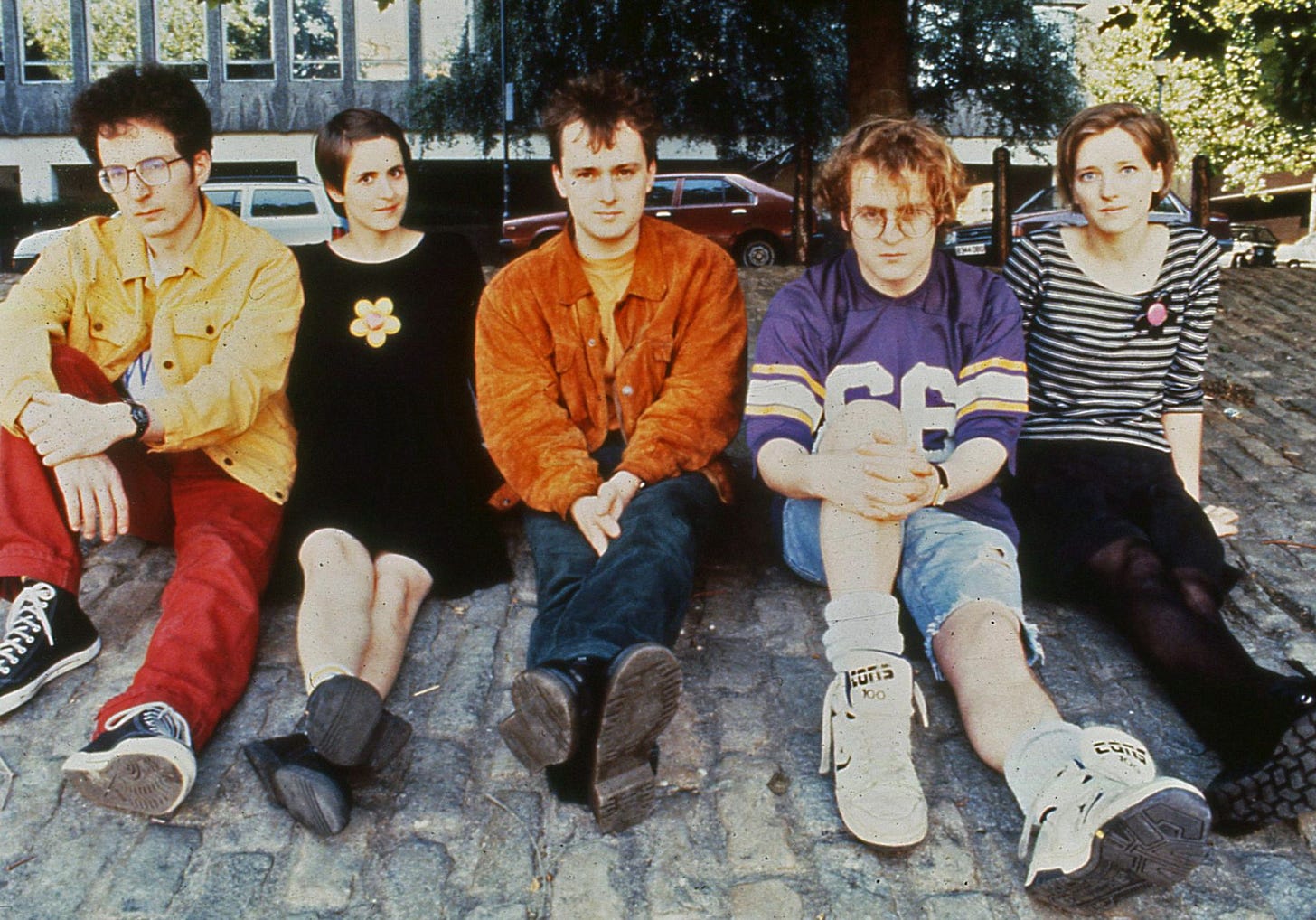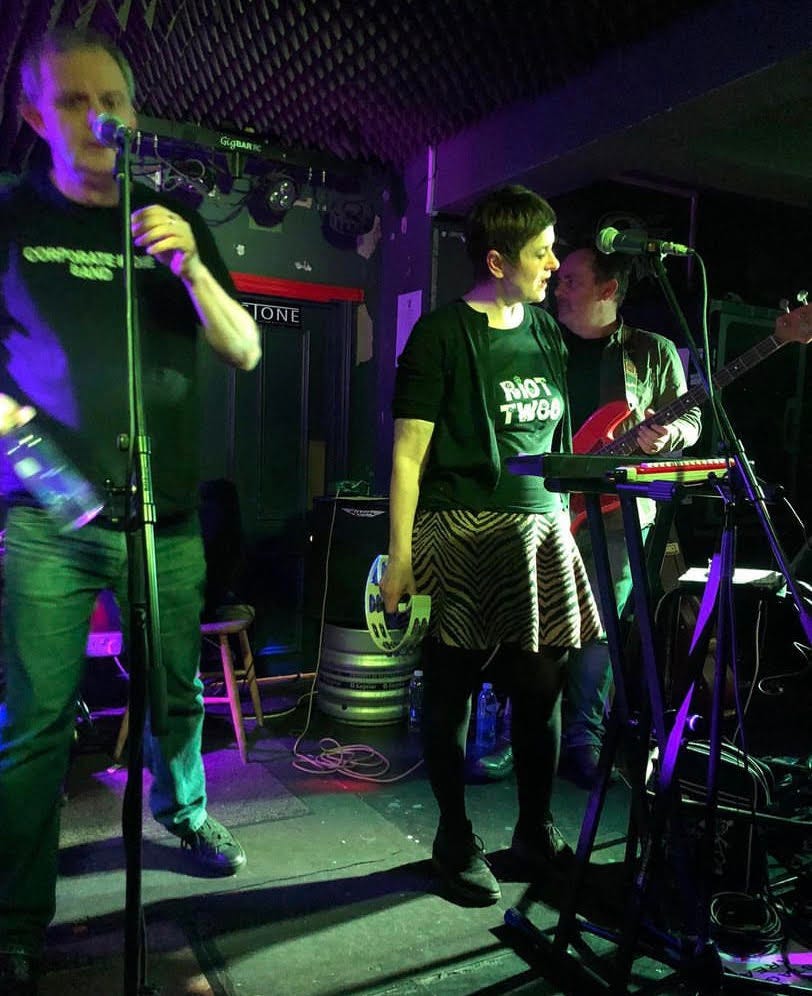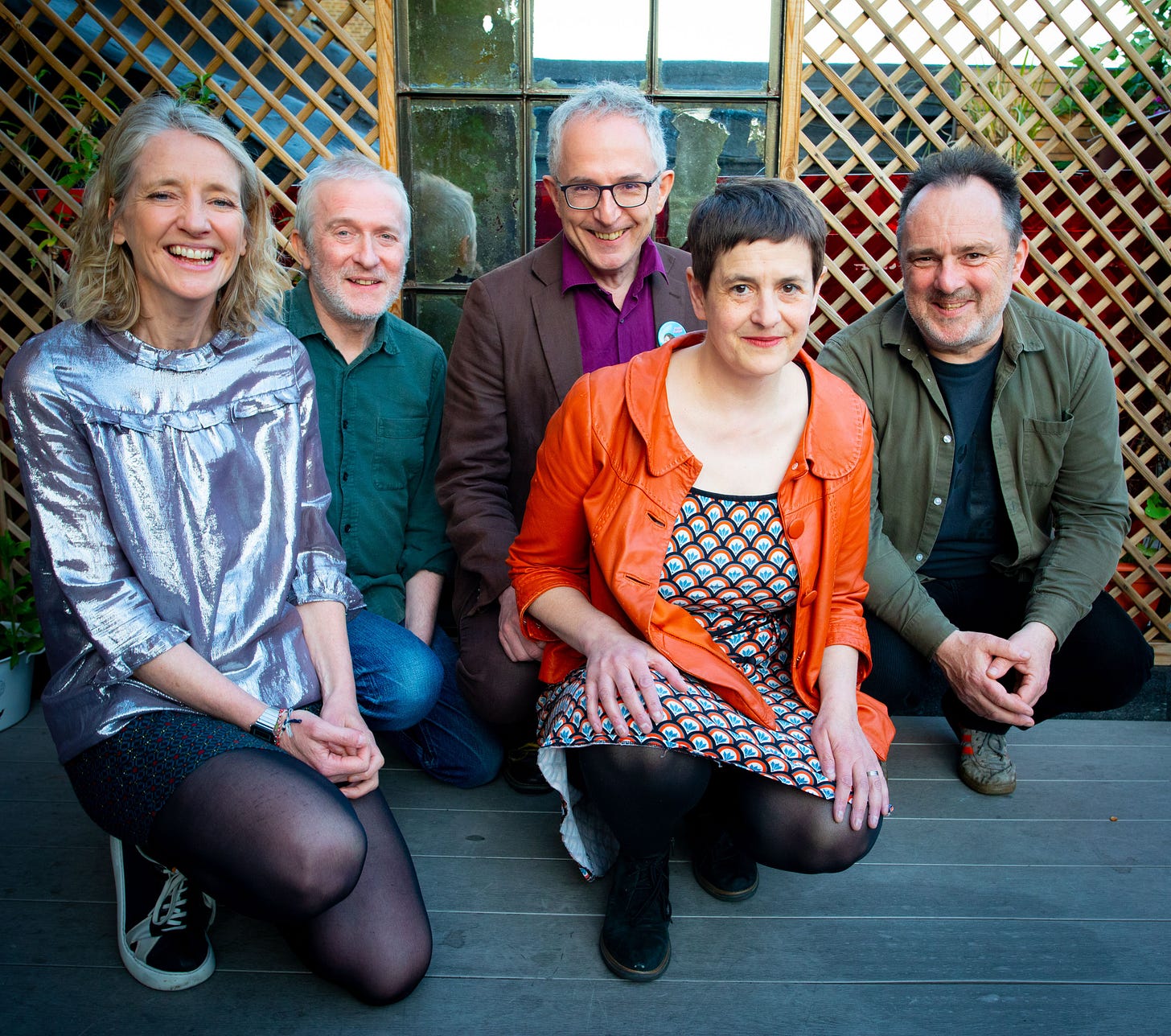5/29/24: An Interview with Heavenly
Amelia Fletcher and Rob Pursey of the legendary indiepop band graced the pages of Quinn's Newsletter ahead of a Heavenly reunion
Hello friends,
I can’t remember the first time I heard Heavenly but it was undoubtably love at first listen. The British indie pop band scratches the everlasting part of me that craves a little jangle, a dash of girl group wistfulness, and lyrics about cool guitar boys and yearning girls in orange corduroy dresses.
Heavenly was formed in 1989 after the dissolution of its brilliantly spunky predecessor, Talulah Gosh, and featured many of the same musicians: Amelia Fletcher (vocals/guitar), Rob Pursey (bass), Matthew Fletcher (drums; Amelia’s brother), and Peter Momtchiloff (guitar). Cathy Rogers (keyboards/vocals) joined around 1992’s Le Jardin de Heavenly. Heavenly released music on two legendary DIY labels, the UK’s Sarah Records and Olympia, Washington’s K. I wrote some in-depth pieces about Heavenly, Sarah, and K here and here.
Heavenly effectively ended in 1996 after Matthew died by suicide. Amelia and Rob continued to make music together as a couple and later started a label, Skep Wax. “We didn’t even think about restarting Heavenly without him, it felt wrong for a long time,” Amelia says of her brother over a video call. “But it’s obviously been a very long time and there’s this guy, Ian Button, who plays in our other bands, Swansea Sound and The Catenary Wires. He’s lovely and we thought that it could work with him, he could drum in a similar way and would understand the sensitivity around the whole situation.”
Later this week, Heavenly will play their first U.S. shows since 1995. The Brooklyn gigs are sold out but I believe there are still tickets to the daytime show, which also features Widowspeak and Franz Charcoal (iykyk) alongside DJ Kip Berman. Swansea Sound will then head out on mini tour with support from Jeanines. Fear not, West Coast friends—Heavenly will be swinging through in October alongside envy-inducing openers Tullycraft, All Girl Summer Fun Band, and Touch Girl Apple Blossom.
Rob and Amelia joined me to dish about riot grrrl, the changing implications of the word “twee,” and finding community inside a crumbling music industry.
Why bring Heavenly back after all these years?
Amelia Fletcher: We have carried on doing music so we haven’t felt the need to go backwards. We are always more excited about what we’re doing today than what we did in the past. But we discovered that Heavenly albums and singles were selling for silly amounts on Discogs. Our friend Ian, who runs a label called Damaged Goods, asked if he could do a Heavenly singles compilation and was surprised by how well it did. So we thought, if people are that interested in Heavenly and can’t get the albums, we should put them out again. Throughout the process, people started playing Heavenly on the radio and “P.U.N.K. Girl” became a bit of a TikTok viral hit.
Amelia, how has it been to revisit these songs that you wrote in your 20s? Do you hear any of your songs differently?
AF: I stopped playing guitar after Heavenly so there was the basic technical issue of not playing in 30 years! It’s been really interesting to go back and realize that I actually wrote quite good songs. I remembered them as not being especially good, but they’re quite smart. There aren’t any lyrics that I’m too embarrassed about. It’s been quite interesting to look at the development across albums with a grown-up’s eye, seeing me grow from the excitable, girl groupy, love-focused first album to discovering riot grrrl to wanting to be a bit more experimental on the last album, all the while retaining a focus on pop music.
You’ve spoken about how visiting America and discovering riot grrrl shifted your thoughts on feminism and gave you a language to explore your anger. How did this affect your songwriting?
AF: We went over to Olympia to play some shows and discovered Bratmobile and Bikini Kill. I recently found an old interview with me about being a woman in an indie band. I’m sitting there slagging off the misogyny of the music press and being very much in line with what riot grrrl would talk about, but what I didn’t do is put it in my songs. I found riot grrrl incredibly exciting because I didn’t think of myself as a feminist back in the UK. I just thought of myself as a woman amongst women who were wronged, I didn’t put the F word on that. So riot grrrl taught me that there was a term for what I am. They were putting that stuff into their music and I was like, Oh, we could do that too. So there’s a lyrical difference but also a musical one because we were inspired by the slightly more aggressive sound of riot grrrl, even though we never really sounded like a riot grrrl band.
Olympia has been mythologized over the years as an indie paradise, what were your first impressions of the city?
Rob Pursey: Olympia was amazing at the time because it was K and Kill Rock Stars down the road in this really small town. We had never been there before so it was very exciting but it was also amazing how easily we fit in, there was no language barrier, no culture barrier.
AF: The branding of Sarah—though they wouldn’t have used that term—was what I would think of these days as indie: public transport and playing really nice songs sweetly on guitars and sharing your heart on your sleeve. It wasn’t very punk. K ended up releasing quite similar music and the labels shared a lot of the same beliefs. But K had this added ethos of punk because of the close links with Dischord and I think that meant that K was able to sell its music as cooler, somehow. We were exactly the same band but we were cooler in America than in the UK.
Is there anything from that time that you think has been misconstrued or overly mythologized?
RP: I think the ambition of Sarah and what the project was trying to do politically has become clearer in retrospect. To live in Bristol and to put on pictures of buses and small trains on your record sleeves is a deliberately parochial thing. They wouldn’t let bands put pictures of women on their sleeves because it was such a sexist cliche. They were doing lots of things that were really brilliant and I don’t think they were totally appreciated for that. It has become mythologized and there are obsessive people who collect every Sarah single. I’m sure Matt [Haynes] and Clare [Wadd] would agree with this but not every single was brilliant, there was a varying degree of quality. So the idea that Sarah is the gateway to some shimmering, indie oasis is probably a bit exaggerated.
AF: In terms of mythologization, the only thing I would call out is that K was very much the child of both Calvin Johnson and Candice Peterson. We signed to K partly because of Calvin, but it was Candice who discovered Heavenly and asked us if we wanted to be on the label. She was quiet and people didn’t notice her because Calvin was such a big character. She was part of why it worked as a label, she did a lot of stuff in the background that made it successful.
What’s your relationship with the word twee then and now?
RP: It was definitely an insult and we resented it. There were similar words bandied about at the time: cardigans, bedwetting, fey. There was a misogynistic undertone that if you’ve got a band with women in it and they don’t dress like rock chicks, then they’re children. But at the same time, the way some people in the scene dressed was willfully childish as if to say, the adult corporate world looks rubbish so we won’t grow into it. But then twee changed and seemed to refer to slightly preppy clothes and people wearing glasses. Now it’s become a sort of neutral genre term that refers to a kind of music of which we are a part, whether we like it or not. We’ve decided to embrace it, you can’t control what words mean. So we made some t-shirts and badges that said “riot twee” in flowery Heavenly letters.
To me, “Hearts and Crosses” is the epitome of riot twee.
AF: What I’ve always liked about “Hearts and Crosses” is that it’s about a naive girl and starts in this very lovey, happy way before suddenly turning nasty. It was clearly about innocence destroyed. I likely wasn’t thinking about this when I wrote it, but it’s almost a reaction to my own older song, taking the innocence of the earlier records and adding this extra layer that suggests that I’ve grown up a bit.
Have you applied your own experiences on indie labels to running Skep Wax?
AF: The thing that united the bands on Sarah was that Matt and Clare really liked them. It really came across as a label of love formed by the taste of two people. Skep Wax is quite a lot of work. We’re not desperate to have hits or make money off it so we’re only going to release something if we absolutely love it and want people to hear it. Running a label feels like a way of helping to foster a community.
RP: One thing I did take from them and from other labels is that they are part of the ecology of an independent space. Even if you are operating outside of what’s called the music industry, you can create a space where music comes out and is distributed and labels are still quite an important part of that. The reason we still do music is because we never got involved in the corporate music industry so we’re still quite enthusiastic and that’s partly because we had labels like Sarah and K that were quite effective.
Amelia, last year you wrote a letter to Spotify CEO Daniel Ek concerning their proposal to demonetize all tracks under 1000 streams. As an economist and a musician, what about this touched a nerve for you?
AF: That specific proposal typified what we were generally upset about with Spotify but it was particularly outrageous because he talks about supporting creativity. Spotify does give a lot of money to artists and to the record industry, but they failed to recognize all the things they’ve cannibalized, all the physical sales that are not happening now. It feels like Payola is back, you can get on an edited playlist in return for a lower royalty rate. I was particularly upset by the language that claimed this was a strategy designed to support “real artists.” How dare you? As if all these people making amazing music are not real artists.
RP: I think Spotify is the most obvious manifestation of a music industry that’s become disgustingly over-centralized and corrupt and greedy. The technology of streaming is incredible, there’s nothing wrong with it, per se, but the net effect of it is that the population, the consumers, have been persuaded to believe that music is pretty much free. And the reason is not because Daniel Ek is taking a pay cut, it’s because all the people that make the music don’t get anywhere near as much money as they used to.
A typical Swansea Sounds track satirizes the music industry. Is there anything that makes you feel optimistic?
RP: The ongoing existence of some kind of independent scene always makes me feel optimistic but it’s a lot harder to be a young band. If the circling corporate vultures had their way, there would be 20 acts in the whole world and they’d all be milked to death. I think that’s their happy version of the future: less creative mouths to feed and more technological ways of feeding the consumer. I suppose that doesn’t sound very optimistic.
AF: It doesn’t. I think there are lots of young people who really love music and that’s why I don’t think that AI is going to completely take over. One reason that I think they love music has to do with the character of the music and the people that make it. In the end, they care about music being made by the humans that they care about.
RP: Amelia is determined to be optimistic at all times. The level of change that’s required is like when the American government broke up the railroad monopolies. In the meantime, we can carry on making little satiric noises from the corner.





Jfc, “bedwetting”! That’s brutal.